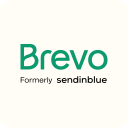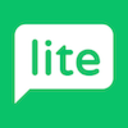ConvertKit vs Mailchimp: Which is the right email marketing tool for you?
- 01Kit (ex. ConvertKit) vs Mailchimp: overview
- 02What's the difference between Kit (ex. ConvertKit) and Mailchimp?
- 03Kit (ex. ConvertKit) pros and cons
- 04Mailchimp pros and cons
- 05Kit (ex. ConvertKit) compared to Mailchimp
- 06Mailchimp compared to Kit (ex. ConvertKit)
- 07Features comparison
- 08Kit (ex. ConvertKit) vs Mailchimp: Which is the best for your business?
- 09Promotions on Email Marketing software
- 10Alternatives to Kit (ex. ConvertKit) & Mailchimp
Save up to $1,870 on Mailchimp
Save up to $1,870 on Mailchimp
Email marketing campaigns are the cornerstone of many businesses’ digital marketing strategies. A proven way to grow and engage with an audience, email marketing is an affordable way to deliver personalized campaigns to a large audience. But finding the right tool isn’t always easy. With endless options, choosing the best one for your business can feel overwhelming.
Sound familiar? Then this article is for you. We compare two popular email marketing platforms, ConvertKit vs Mailchimp, including their key features, pricing, and customer service. By the end of this article, you’ll know exactly which tool is for you!
Kit (ex. ConvertKit) vs Mailchimp: overview
ConvertKit and Mailchimp are two prominent players in the world of email marketing and automation, each with its own set of unique strengths tailored to meet specific user needs.
ConvertKit is known for its simplicity and user-friendly approach to email marketing. It offers a straightforward email marketing platform that focuses on helping creators, bloggers, and small businesses build and nurture their email lists. On the other hand, Mailchimp offers a comprehensive suite of marketing tools suitable for businesses of all sizes. Beyond email marketing, Mailchimp provides features like marketing automation, social media management, and e-commerce integration.
Now, let's dive into the ConvertKit vs. Mailchimp comparison to help you make an informed decision when selecting the right email marketing platform for your specific needs and goals.
What's the difference between Kit (ex. ConvertKit) and Mailchimp?

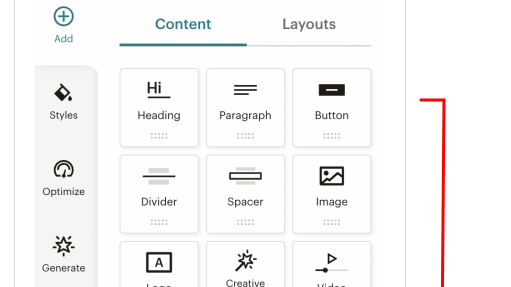
Several differences between ConvertKit and Mailchimp may help you decide which tool is for you. Firstly, the two products target different audiences. ConvertKit is specifically designed for creators including authors, bloggers, coaches, and podcasters. It offers tools to help creators grow their audience and monetize their offerings, like email marketing, newsletters, and a simple landing page builder. Mailchimp is marketed towards a broader audience of small to medium businesses across various industries, including e-commerce. Marketers with all levels of experience can use it and it’s especially accessible to those with limited email marketing experience.
Another crucial difference between Convertkit and Mailchimp is their approach to email creation. ConvertKit’s email designer was, up until recently, plain text only, requiring basic HTML knowledge. ConvertKit’s new visual editor uses content blocks to let you create 3-column layouts, add rich media content, and insert HTML blocks if needed. This simplified approach is intentional. ConvertKit believes that plain text, clean emails are more effective than heavily-designed ones. In comparison, Mailchimp’s drag-and-drop editor offers more flexibility. Its highly customizable content blocks let you tailor email designs to suit your brand. Plus, it provides a vast range of templates.
Finally, contact management also differs between the two platforms. ConvertKit lets you have one list of contacts, which you can separate into audiences using tags and segments. This may present some limitations. For example, when someone unsubscribes from one list, they are automatically removed from the other list. For this reason, ConvertKit recommends creating separate accounts for different businesses with clearly defined audiences. Mailchimp also uses tags and segments to organize contacts. Although Mailchimp encourages users to maintain a single contact list, it is possible to create separate ones. This treats contacts, including duplicate ones, as separate. But keep in mind that Mailchimp’s prices increase as your number of contacts does.
Kit (ex. ConvertKit) pros and cons
What are the advantages of Kit (ex. ConvertKit)?
- Subscriber-centric approach: ConvertKit's focus on a subscriber-centric model makes it easy to organize and manage subscribers. You can tag and segment subscribers based on their interests and actions, allowing for highly targeted email campaigns.
- Automation: ConvertKit excels in automation. It offers a visual automation builder that's user-friendly, making it easy to create complex email automation sequences to nurture leads and engage subscribers.
- Customizable opt-in forms: You can create attractive and customizable opt-in forms with ConvertKit to capture leads effectively. These forms can be embedded on your website or landing pages.
- Content upgrades: ConvertKit provides features like content upgrades, allowing you to deliver specific lead magnets or incentives to subscribers based on their preferences and behavior.
- Creator-friendly: ConvertKit is particularly popular among content creators, bloggers, and online entrepreneurs due to its simplicity and features tailored to their needs. It's designed to help these users grow their audience and income through email marketing.
What are the disadvantages of Kit (ex. ConvertKit)?
- Pricing: ConvertKit can be relatively expensive for small businesses and beginners compared to some other email marketing platforms, especially as your subscriber list grows.
- Limited A/B testing: ConvertKit's A/B testing capabilities are more basic compared to some competitors. It may not offer as much granularity for testing and optimizing email campaigns.
- Template variety: ConvertKit's email template library is somewhat limited compared to other email marketing platforms. This can limit your design options for email campaigns.
- Integration challenges: While ConvertKit integrates with many third-party tools, it may not have as extensive an integration ecosystem as some other email marketing platforms. You should ensure it integrates with the specific tools you use.
- Learning curve: Although ConvertKit is designed for simplicity, newcomers to email marketing may still find a learning curve, particularly when setting up complex automation sequences.
Compare Kit (ex. ConvertKit) to other tools
Mailchimp pros and cons
What are the advantages of Mailchimp?
- User-friendly interface: Mailchimp is known for its user-friendly and intuitive interface. It's easy for beginners to navigate and use, making it accessible for those new to email marketing.
- Comprehensive features: Mailchimp offers a wide range of features beyond email marketing, including marketing automation, social media management, e-commerce integration, and landing page creation. This all-in-one approach can save time and effort in managing various aspects of your marketing strategy.
- A/B testing: Mailchimp provides robust A/B testing capabilities, allowing you to test different email elements and optimize your campaigns for better results.
- Template variety: Mailchimp offers a diverse selection of email templates, making it easy to create visually appealing and responsive email campaigns without the need for extensive design skills.
- Generous free plan: Mailchimp offers a free plan with basic email marketing features, making it accessible for small businesses and startups with limited budgets.
What are the disadvantages of Mailchimp?
- Pricing for large lists: Mailchimp's pricing can become relatively expensive as your subscriber list grows. This can be a disadvantage for businesses with substantial email lists.
- Limited automation on free plan: The free plan has limited automation features, which means you may need to upgrade to a paid plan to access advanced automation capabilities.
- Email deliverability: Some users have reported issues with email deliverability, particularly with the free plan. This can affect the reach of your email campaigns.
- Complex pricing tiers: Mailchimp's pricing structure, with its tiered approach, can be confusing for some users. Understanding which features are included in each plan can be challenging.
- Integration challenges: While Mailchimp offers a variety of integrations, there may be cases where a specific integration you need is not available or requires additional setup and customization.
Compare Mailchimp to other tools
Kit (ex. ConvertKit) compared to Mailchimp
When comparing ConvertKit and Mailchimp, ConvertKit sets itself apart with its simplicity and focus on creators and content-driven businesses. It's an appealing choice for those who value an uncomplicated user experience and are looking for a platform tailored to their specific email marketing needs. ConvertKit's pricing structure, while not as expansive as Mailchimp's, is designed to accommodate users at various stages, including a free plan for those just starting their email marketing journey.
One of ConvertKit's standout features is its subscriber-centric approach, making it easy to organize and manage your email list. The platform's segmentation and tagging options allow for precise targeting, ensuring your subscribers receive content that resonates with their interests and behaviors. This is especially beneficial for content creators and bloggers who rely on audience engagement.
Is Kit (ex. ConvertKit) better than Mailchimp?
Determining whether ConvertKit is superior to Mailchimp in the realm of email marketing hinges on your distinct requirements. ConvertKit shines with its user-friendly interface, making it an excellent choice for marketing novices. It distinguishes itself by catering to content creators, offering specialized tools for bloggers, podcasters, and YouTubers.
ConvertKit's customizable opt-in forms and content upgrade features empower bloggers to grow their subscriber lists effectively. In contrast, Mailchimp boasts broader capabilities, such as an integrated CRM and multi-channel marketing options, which can be invaluable for larger enterprises aiming for a unified marketing approach.
What is Kit (ex. ConvertKit) best used for?
ConvertKit excels as a robust email marketing automation tool, tailor-made for online creators such as bloggers, podcasters, and YouTubers. Its user-friendly interface empowers users to effortlessly automate email marketing tasks, streamlining their efforts.
Bloggers can use ConvertKit to create drip email campaigns that automatically deliver new blog posts to subscribers, ensuring content reaches the right audience at the right time. Additionally, ConvertKit's segmentation capabilities enable YouTubers to categorize subscribers based on their video preferences, allowing for highly targeted video content promotions. Overall, ConvertKit's versatility makes it an ideal choice for content-driven creators seeking to engage their audience with tailored email campaigns.
Can Kit (ex. ConvertKit) replace Mailchimp?
The question of whether ConvertKit can replace Mailchimp hinges on the specific demands of your business. ConvertKit excels as a streamlined email marketing solution, making it an excellent substitute for Mailchimp if simplicity and precision are your priorities. For instance, bloggers can effortlessly transition from Mailchimp to ConvertKit for managing their email lists and automating content delivery.
However, if your business relies on multi-channel marketing strategies or needs a built-in CRM system to manage customer relationships comprehensively, Mailchimp's array of features remains valuable. In such cases, integrating ConvertKit for specialized email campaigns while retaining Mailchimp for broader marketing functions might be a strategic approach.
Is Kit (ex. ConvertKit) cheaper than Mailchimp?
When comparing the cost of ConvertKit to Mailchimp, it might appear that ConvertKit's initial pricing tier is higher. However, a closer examination unveils a more nuanced perspective.
ConvertKit's pricing structure is based primarily on subscriber count, and every plan includes access to its full range of features. This transparent approach ensures that users get access to all available tools, with costs scaling as their subscriber list grows. In contrast, Mailchimp employs a tiered pricing model where each plan unlocks different features. This can lead to potentially higher costs as businesses move up to access essential functionalities, making ConvertKit an attractive choice for those seeking cost efficiency and feature transparency.
Is there a better Email Marketing software than Kit (ex. ConvertKit)?
While ConvertKit offers a range of valuable features, it's essential to consider other email marketing software options to determine the best fit for your specific needs.
Several notable alternatives to ConvertKit in the email marketing landscape include Mailchimp, Constant Contact, Brevo, and HubSpot Email Marketing.
Selecting the right email marketing software depends on your business's distinct demands, preferences, and objectives. If you're in search of a platform that excels in core email marketing functions, prioritizes attention to detail, and boasts a user-friendly interface, ConvertKit might be the perfect choice for your email marketing endeavors.
Mailchimp compared to Kit (ex. ConvertKit)
Mailchimp stands out with its extensive suite of marketing tools and versatility, making it an attractive choice for businesses seeking an all-in-one marketing solution that goes beyond email campaigns. Mailchimp's pricing options cater to a wide range of users, from small businesses to larger enterprises, providing flexibility in meeting diverse marketing needs.
One of Mailchimp's standout features is its comprehensive approach, which includes email marketing, automation, social media management, e-commerce integration, and more. This multifaceted approach is ideal for businesses aiming to consolidate their marketing efforts and manage various channels from a single platform.
Is Mailchimp better than Kit (ex. ConvertKit)?
Deciding whether Mailchimp outshines ConvertKit relies heavily on your distinct requirements. Mailchimp's expansive feature set, including an integrated CRM and multi-channel marketing capabilities, positions it as a formidable choice for larger enterprises seeking a holistic marketing platform.
E-commerce businesses can leverage Mailchimp's e-commerce integration to streamline customer data and execute targeted marketing campaigns. In contrast, ConvertKit's user-friendly interface and tailored support for content creators, like bloggers and YouTubers, make it an attractive option for those niches. Bloggers can use ConvertKit's customizable forms and automation to enhance subscriber engagement, while YouTubers can segment their audience based on video preferences for more personalized promotions.
What is Mailchimp best used for?
Mailchimp is an optimal choice for businesses requiring a comprehensive suite of marketing tools that extend well beyond email campaigns. Its diverse capabilities encompass not only email marketing but also encompass social media ads, landing page creation, digital advertising, and even physical postcards.
Online businesses can leverage Mailchimp's features to design targeted Facebook and Instagram ads, craft engaging landing pages for product launches, and send personalized postcards as part of their customer engagement strategy. Furthermore, Mailchimp's built-in CRM empowers businesses to achieve exceptional levels of customer segmentation, personalization, and interaction tracking, enhancing their ability to deliver precisely tailored marketing messages and campaigns.
Can Mailchimp replace Kit (ex. ConvertKit)?
Considering whether Mailchimp can effectively replace ConvertKit depends on your specific business needs. If your requirements extend beyond basic email marketing and encompass customer relationship management (CRM) and multi-channel marketing, Mailchimp's comprehensive suite of features could be a valuable replacement for ConvertKit.
Mailchimp's built-in CRM makes it easy to manage customer data and interactions effectively, while also utilizing its multi-channel capabilities to execute integrated marketing campaigns across email, social media, and advertising platforms. However, the decision should align with your precise marketing goals and the scalability required for your operations, as ConvertKit excels in simpler, content-focused email marketing.
Is Mailchimp cheaper than Kit (ex. ConvertKit)?
When comparing the cost-effectiveness of Mailchimp and ConvertKit, it's essential to consider the intricacies of their pricing structures. Mailchimp’s tiered pricing gives you a choice of subscription, where each plan unlocks specific features. This approach may result in higher costs if you need access to advanced functionalities.
If you're seeking automation and CRM capabilities, you may need a more expensive Mailchimp plan. In contrast, ConvertKit's pricing model is primarily subscriber-based, offering consistent access to all features across plans. This can translate into cost savings, especially for businesses with growing subscriber lists that require various email marketing features without incurring additional expenses.
Is there a better Email Marketing software than Mailchimp?
Mailchimp offers a comprehensive suite of marketing tools but it's essential to consider other email marketing software options to ensure your choice aligns perfectly with your specific needs.
Several notable alternatives to Mailchimp in the email marketing landscape include Brevo, GetResponse, ConvertKit, and MailerLite.
Selecting the most suitable email marketing software depends on your business's distinct requirements, priorities, and personal preferences. If you're searching for a platform known for its core email marketing functionalities, meticulous attention to detail, and a user-friendly interface, Mailchimp may indeed be the right choice for you.
50% off the Standard plan for 6 months on Mailchimp
Get 50% off the Standard plan for 6 months on Mailchimp and up to $1,870 savings with Secret.
Features comparison
Mailchimp Takes the Lead Against ConvertKit for Ease of Use

In the realm of user-friendliness, Mailchimp takes the lead when compared to ConvertKit, despite ConvertKit's reputation for simplicity. ConvertKit is indeed designed with a focus on clarity and user-friendliness, offering features like visual automation builders and intuitive analytics. For instance, bloggers and content creators appreciate ConvertKit's easy-to-understand interface for crafting personalized email sequences.
However, Mailchimp's user interface has gained a reputation for being even more intuitive and user-friendly. Its drag-and-drop email builder, extensive template library, and user-friendly analytics dashboard cater to a broader audience. For instance, small businesses can create visually stunning email campaigns effortlessly using Mailchimp's user-friendly tools, enhancing their marketing efforts.
Mailchimp Outperforms ConvertKit with its Extensive App Directory

When it comes to integrations, Mailchimp outperforms ConvertKit with its extensive app directory. While both platforms offer a wide range of integrations, Mailchimp takes the lead in this regard. With the capability to connect with over 300 web services, including e-commerce platforms, social media networks, CRM systems, and project management tools, Mailchimp provides an expansive integration landscape. For example, businesses can seamlessly integrate Mailchimp with e-commerce platforms like Shopify or WooCommerce to automate email marketing for their online stores.
On the other hand, ConvertKit, while offering solid integration options, has a more limited list of possibilities compared to Mailchimp. Although it integrates well with popular platforms like WordPress and Zapier, its overall range is not as extensive as Mailchimp's.
So, if your business relies heavily on a broad spectrum of integration possibilities to streamline various aspects of your marketing and operations, Mailchimp would be the preferable choice due to its extensive app directory.
Mailchimp Excels Ahead of ConvertKit at Sending the Right Message at the Right Time

Mailchimp takes the lead over ConvertKit in delivering the right message at the right time, thanks to its robust automation capabilities. Mailchimp empowers businesses to seize every opportunity by sending highly personalized messages to customers based on their unique profiles and interactions with the company. For example, e-commerce businesses can utilize Mailchimp's automation to send targeted product recommendations to individual customers based on their past purchases and browsing behavior.
In contrast, ConvertKit's strength lies in high-volume sending, which may not offer the same level of personalization and precision as Mailchimp's automation. Therefore, if your goal is to create tailored and timely messaging to engage your audience effectively, Mailchimp's automation features provide a distinct advantage in delivering highly personalized content.
ConvertKit Leads Ahead of Mailchimp in Automated Email Responses

ConvertKit excels over Mailchimp in the realm of automated email responses. ConvertKit's automated email response feature empowers businesses to streamline their communication processes, guaranteeing prompt replies to customer queries or actions. An online store can set up automated responses to acknowledge and provide order updates to customers immediately after purchase, enhancing customer satisfaction and reducing manual workload.
While Mailchimp also offers automation capabilities, its primary focus leans toward timing and message personalization. While this is valuable, it may not deliver the same level of automated response functionality as ConvertKit. Therefore, for businesses looking to enhance customer engagement and efficiency through automated responses, ConvertKit's feature set provides a significant advantage.
ConvertKit Offers Superior A/B Testing Compared to Mailchimp
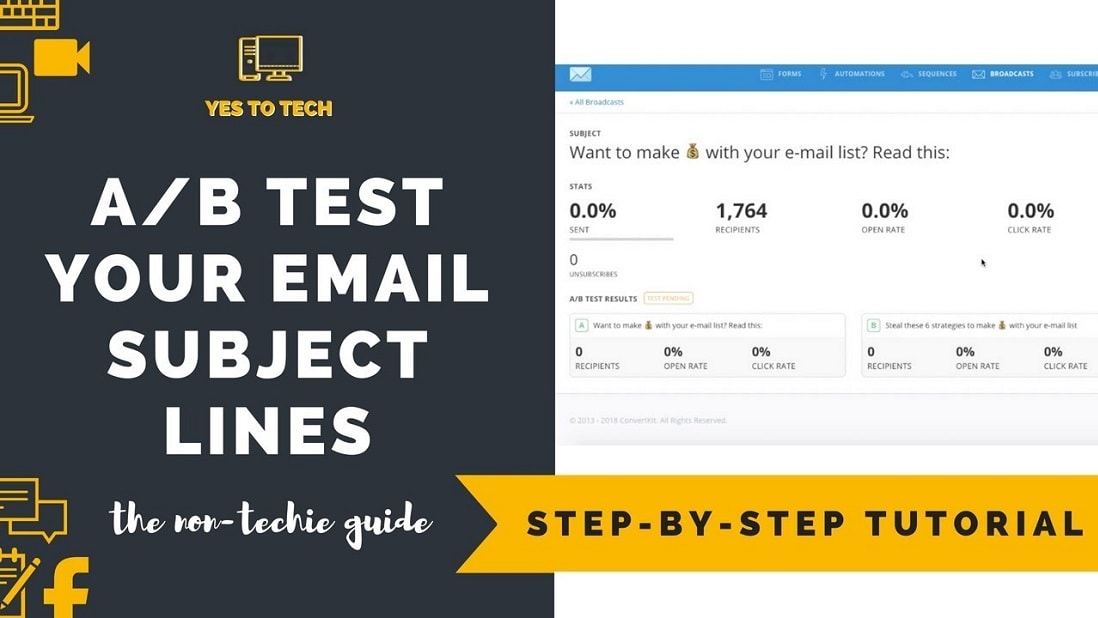
ConvertKit offers an edge over Mailchimp in terms of A/B testing capabilities. With ConvertKit, businesses benefit from an intuitive A/B testing feature, allowing them to compare various email versions to determine what resonates best with their audience. An e-commerce store can A/B test different subject lines or email content to identify the most effective approach for increasing click-through rates and conversions.
In contrast, while Mailchimp provides optimization tools based on best-performing campaigns, it may not offer the same level of direct A/B testing capabilities as ConvertKit. This means that businesses seeking more granular control and insights into their email campaigns may find ConvertKit's A/B testing features particularly advantageous for refining their email marketing strategy.
Mailchimp Segments Customers Better than ConvertKit
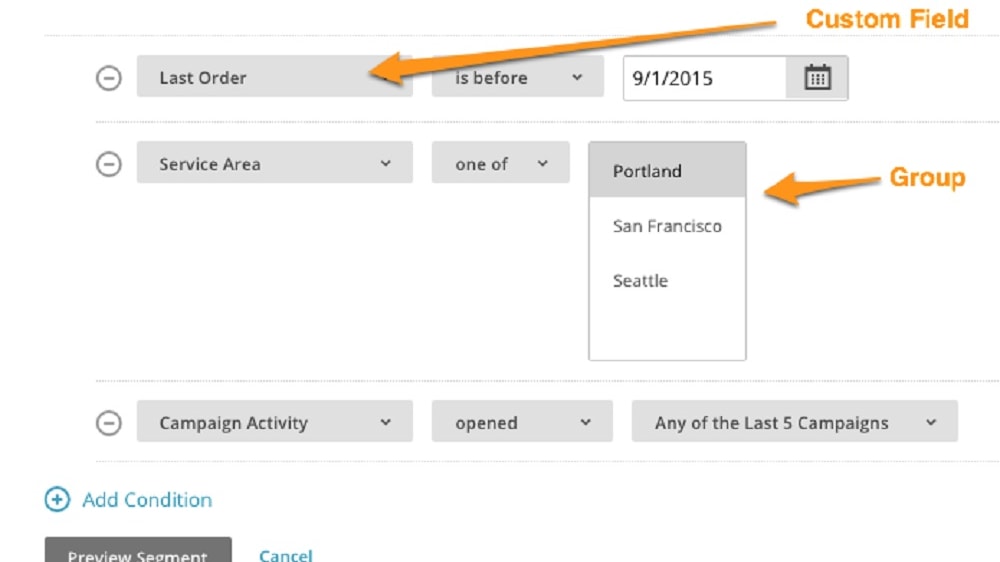
Mailchimp outshines ConvertKit in customer segmentation, offering an array of advanced options. Mailchimp's platform enables businesses to create finely-tuned customer segments based on behavior or interests. E-commerce retailers can segment its audience to target customers who have previously purchased a specific product category with tailored promotions.
Moreover, Mailchimp's predictive segmentation is a powerful tool that identifies customers most likely to make repeat purchases or increase their spending over time. This predictive feature enables businesses to proactively engage high-value customers with relevant content and offers, further boosting sales and customer loyalty.
In contrast, ConvertKit, while proficient in offering basic reporting and segmentation features, does not explicitly mention the same level of advanced and predictive segmentation capabilities as Mailchimp. Therefore, for businesses seeking precise and data-driven customer segmentation, Mailchimp provides a distinct advantage.
Mailchimp’s Design Tool is Superior Compared to ConvertKit

Mailchimp takes the lead in design tools when compared to ConvertKit. Mailchimp's design tool, powered by artificial intelligence, stands out for its ability to effortlessly create visually appealing, multi-channel designs. This is especially valuable for businesses aiming to capture and retain the attention of prospects and customers during email campaigns. Businesses can use Mailchimp's design capabilities to craft eye-catching email templates that align with their brand identity, increasing engagement and click-through rates.
In contrast, while ConvertKit offers useful features like email and mobile preview, it may not provide the same level of design sophistication and AI-driven design assistance that Mailchimp offers. Therefore, for businesses looking to elevate the visual appeal of their email campaigns, Mailchimp's design tool provides a significant advantage.
Subscribe to our newsletters.
No FOMO here. Stay up-to-date on all the latest deals and news with our monthly newsletter straight to your inbox like 125,000+ entrepreneurs (+ Get 10% off on on our Premium Membership!)
Kit (ex. ConvertKit) vs Mailchimp: Which is the best for your business?
Kit (ex. ConvertKit) is the best tool for you if:
- You’re an online content creator, including a blogger, author, podcaster, or solo business owner looking for a simple yet customizable email marketing platform
- Tailored engagement with your audience is a priority, requiring tools that help you precisely categorize your audience including robust segmentation and tagging features
- You rely on drip email campaigns to build customer relationships and engagement or guide them through the buying process
- You’re a small e-commerce store wanting access to automated email responses to respond to client questions or issues quickly
- You have a single audience and only require one contact list for your email marketing
Mailchimp is the best tool for you if:
- For consistent branding, you require an all-in-one digital marketing tool with email and SMS marketing, landing pages, surveys, postcards, and website creation
- You’re a small or large business requiring a high degree of design flexibility and access to various templates to develop your email marketing campaigns
- You’re looking for a wide range of integrations to ensure your email marketing solution is compatible with your existing software
- You require an integrated CRM to centrally manage customer data, preferences, and interactions for effective segmentation and personalization
- You have limited email marketing experience and want a user-friendly solution that doesn’t involve a steep learning curve for beginners
Alternatives to Kit (ex. ConvertKit) & Mailchimp
Promotions on Email Marketing software
Start saving on the best SaaS with Secret.
Secret has already helped tens of thousands of startups save millions on the best SaaS like Kit (ex. ConvertKit), Mailchimp & many more. Join Secret now to buy software the smart way.






